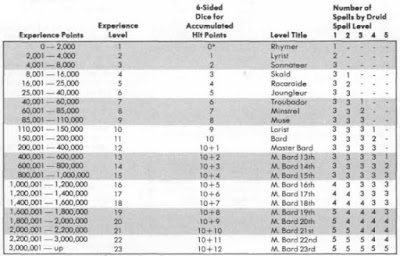The druid class first appeared in Supplement III to OD&D, Eldritch Wizardry (1976). Though the supplement gives Gary Gygax and Brian Blume the byline, the class was actually the creation of Dennis Sustare, who's credited with a special thanks (and dubbed "The Great Druid"). Here's the original list of druid level titles:
The level titles of the druid found in the AD&D Players Handbook (1978) is nearly identical, except that Gygax has inserted a new title, "ovate," between "aspirant" and "initiate of the 1st circle." Its inclusion is interesting, because of its connection to British neo-druidism, where "ovate" is a type of prophet or seer. I suppose it's a good thing that the term and its connections are sufficiently obscure or else critics of the game might have had more "support" for their bad arguments against it.
The ranger class originates in volume 1, number 2 of The Strategic Review (Spring 1975) in an article written by Joe Fischer. Presented as a sub-class of fighting men akin to the paladin (which appeared in the Greyhawk supplement earlier the same year), this OD&D version of the ranger has the following level titles:
The ranger reappears in the AD&D Players Handbook. Its level titles are almost identical to those from The Strategic Review. However, a few of the titles have been transferred to different levels and the original 9th-level title (ranger-knight) has been pushed back to level 10, in order to make room for the title of "ranger."Like the ranger, the bard class first appeared in the pages of The Strategic Review, specifically volume 2, issue 1 (February 1976). Written by Doug Schwegman, the article presents bards as jacks-of-all-trades based on ideas drawn from the Celtic bard, the Nordic skald, and the southern European minstrel. As originally presented, the bard has the following level titles:
The level titles of the AD&D version of the bard differ from the OD&D version in only one small way. The OD&D title of "lore master" is changed – bizarrely, in my opinion – to "lorist," a coinage for which I can find very little evidence in any of the dictionaries to which I have access. Regardless, I find it notable that Gary Gygax, in translating Schwegman's bard to AD&D, retained nearly all the level titles while changing the overall nature of it. Druids explicitly and bards implicitly all belong to an organization that governs their advancement. In the case of druids, this advancement is similar to that of monks in being adjudicated through a trial by combat. I find details of this very fascinating for what they suggest about the "world" of Dungeons & Dragons and how the various character classes fit into it. Perhaps this is a topic worthy of a later post or two.







I don't think there was much danger of *those* critics doing any research.
ReplyDeleteThe nostalgia in me of course loves level titles, however, I have rarely used them. I say rarely in that I use some of the Cleric titles, although my setting has a large monotheistic church and so that fits. Other than that, I use the 9th level titles (Lord, etc), mainly because that’s a huge goal in the campaign.
ReplyDeleteI’ve gotta say though, the thought of some trail-weary Ranger showing up and saluting his commander, “Courser Rogers here, reporting for duty, sir!” makes me smile.
Some of the level titles feel like one would be violating the age old rule: You’re not allowed to give yourself a nickname…
ReplyDelete“Hey guys, I no longer want to be called Robber Jones. I just made 6th level and I’d appreciate it if you’d all call me Filcher Jones now. Thanks everyone….”
As a linguistic aside, the Druid Order title of "Ovate" derives from Gaulish ουατεις, probably deriving from a Proto-Celtic *wātis "seer" and cognate to Latin vātēs "seer". So, Gygax's adoption of the title for the Druid class has historic precedent to some degree.
ReplyDeleteI'd like to say that the ranger titles sort of suggest a sequence of greater power/responsibility/status better than most of the others... but I really did laugh out loud at the AD&D 4th level title. I'm pretty sure I've (personally) never heard or read anything called a "courser" except for a horse.
ReplyDeleteAlso, I don't mean to derail the comments section with my ignorance, _but_... what are the "colleges" that bards belong to as they rise? This is unique to that class, right?
The "colleges" of the Bards are taken from grades of Filí ("poets"; also spelled filid in Middle Irish) as described in the Middle Irish book, Auraicept na nÉces.
DeleteGern,
ReplyDeleteApparently, they are ancient Irish grades of poets. Over on Dragonsfoot, a user called efnisien did a good summary:
https://www.dragonsfoot.org/forums/viewtopic.php?f=1&t=61848#p1382605